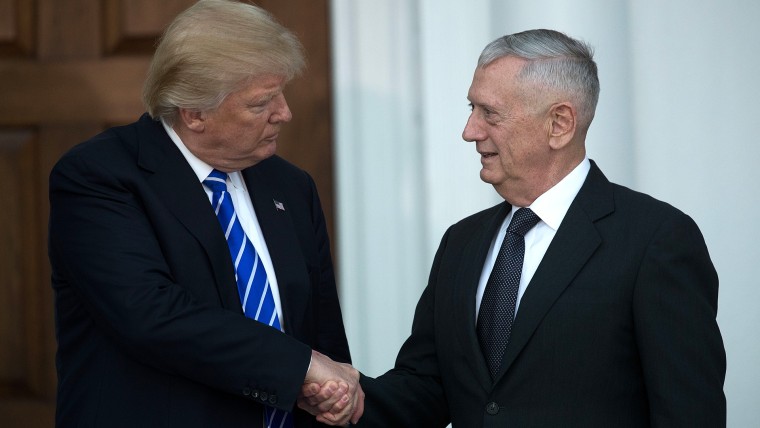Last fall, the New York Times reported that Donald Trump wasn't altogether pleased with Defense Secretary James Mattis, who had repeatedly disagreed with the president on policy and personnel matters. The article said, "Trump has reminded people around him that he regards Mr. Mattis, a retired four-star general, as 'a Democrat' who is more liberal on many issues than he is."
A year later, the president took this same message to the public, telling CBS News' "60 Minutes," in reference to Mattis, "I think he's sort of a Democrat, if you want to know the truth."
Though Mattis has never been overtly partisan, Trump's perspective on the retired four-star general has become increasingly obvious: his Defense secretary has a mind of his own when it comes to the use of military power, and the president doesn't necessarily see that as an endearing quality.
Yesterday, for example, Trump announced a precipitous withdrawal of U.S. troops from Syria, which, as the Washington Post reported, was "a clear rebuke" to the Pentagon chief.
Mattis had argued that the counterterrorism mission in Syria is not over and that the small U.S. presence in Syria should remain, said current and former U.S. officials who spoke on the condition of anonymity to share internal policy discussions.The Pentagon chief also had tried to explain to Trump that there would be more chaos in the region and future problems for the United States if the troops leave, they said.On Wednesday, it became clear Trump was brushing aside his defense secretary's advice.
At first blush, this might not seem like an especially provocative development. Cabinet secretaries have offered presidents advice for generations, and sometimes, that advice has been rejected. Secretaries have the choice of either shrugging it off or resigning.
But with Mattis, the circumstances are more serious. The retired Marine general was supposed to be the adult in the amateur president's orbit, guiding Trump's impetuous hand on how to use military resources and answer national security questions responsibly.
And to be sure, Mattis has repeatedly given this president sound advice. Trump just doesn't seem to like what he's heard -- including on key issues such as NATO and the Iran nuclear deal -- so he's ignored the Defense secretary's perspective.
As of yesterday, Trump is still ignoring the Defense secretary's perspective.
Complicating matters, Mattis occasionally ignores Trump, too. Bob Woodward's included a rather remarkable anecdote in his latest book.
After Syrian President Bashar al-Assad launched a chemical attack on civilians in April 2017, Trump called Mattis and said he wanted to assassinate the dictator. "Let's f***ing kill him! Let's go in. Let's kill the f***ing lot of them," Trump said, according to Woodward.Mattis told the president that he would get right on it. But after hanging up the phone, he told a senior aide: "We're not going to do any of that. We're going to be much more measured." The national security team developed options for the more conventional airstrike that Trump ultimately ordered.
Months earlier, Trump asked Mattis to provide him with military options for Iran. The Pentagon chief reportedly "refused."
How much longer can this professional relationship be sustained?
